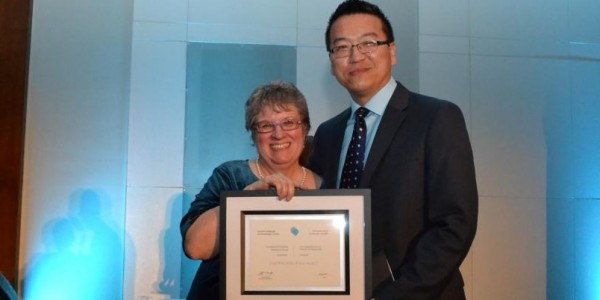Listen up … new study earns the EAR Award
A study published June 23, 2015 in the Canadian Journal of Speech-Language Pathology and Audiology suggests high-frequency middle ear tests may identify transient hearing problems in Neonatal Intensive Care Unit (NICU) babies before they are discharged from hospital. The findings mean time-consuming follow-up tests may be avoided and, as a result, overall health care costs reduced. Just as important, parents may be spared needless worries.
“If a baby fails a hearing screening test, a follow-up diagnostic hearing test needs to be arranged as soon as possible to identify the nature and the degree of a hearing loss,” says Dr. Li Qi of the VGH Neuro-Otology Clinic. “However, many babies fail hearing screening tests at birth due to temporary middle ear issues. Temporary middle ear problems typically require minimum medical treatment or resolve on their own within three to six months.”
A collaboration involving Vancouver General Hospital, the University of Alberta and Glenrose Rehabilitation Hospital in Edmonton, the study earned the Excellent in Applied Research (EAR) Award by Speech-Language and Audiology Canada, which also partially funded the work. Dr. Qi as lead author shares the accolades with Brian Schmidt, Drs. Mosarrat Qureshi, Leonora Henson and Ming Zhang.
Audiologists used high-frequency tympanometry to examine 31 NICU babies aged from one week to six months. Testing results confirmed that high-frequency tympanometry is a promising tool and it might need to be incorporated into screening programs.
“False positive results are a great concern in newborn hearing screening, especially in NICU babies. It’s estimated that 15 to 20 per cent of NICU babies fail a hearing screening test due to temporary middle ear pathologies,” says Dr. Qi. “High-frequency tympanometry is promising tool for middle ear assessment. Unlike traditional low-frequency tympanometry, high-frequency tympanometry can reliably and accurately identify middle ear disorders in a few minutes.”
Two provinces in Canada have a universal Newborn Hearing Program, and B.C. is one of them. “This study is especially important for audiologists in B.C.,” adds Dr. Qi. “It’s estimated that $100,000 have been wasted due to false positive results in newborn hearing screening. As audiologists, we strive to provide evidence-based best practices to our patients.”
Learn more
Using 1000 Hz Tympanometry in Hearing Screening of Babies

